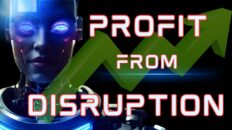- Building the AI Doctor of the Future—Here’s What You Need to Know
Ben Lytle has never stood still. The serial entrepreneur, former Fortune 500 CEO, and author of The Potentialist book series has built and scaled some of the most influential companies in American healthcare—from launching Anthem, Inc. (now Elevance Health), to founding SilverSneakers and Acordia.
Now, he’s applying decades of experience to the most ambitious venture of his career: transforming healthcare with artificial intelligence.
At the helm of The Ark Project, Lytle is not chasing trends—he’s building the future. His team is developing AI agents powered by bounded models—purpose-built systems that can analyze patient data, carry on conversations, and offer accurate, real-time medical support. These aren’t chatbots—they’re virtual health copilots.
“AI isn’t the threat people think it is,” Lytle says. “It’s the cavalry—here to rescue healthcare from a productivity crisis we can’t solve with people alone.”
Lytle’s resume reads like a blueprint for innovation. But where others see AI as a tool to automate, he sees it as an opportunity to elevate the human experience—particularly in medicine.
At The Ark Project, Lytle and his team are engineering “bounded” AI models—specialized systems trained on deep, controlled medical datasets instead of the open internet. The goal? Unprecedented accuracy, privacy, and consistency in patient care.
“These models don’t hallucinate,” Lytle explains. “They’re not guessing based on Reddit threads or Wikipedia. They’re trained like the best doctors, but they’re available 24/7 and scalable to millions”.
Already in pilot programs with physician groups, these AI agents are helping manage complex chronic conditions, guiding patients in real-time, and feeding actionable insights back to doctors. Patients interact with emotionally aware avatars that offer everything from daily health check-ins to medication tracking, and even help in prepping smarter questions before appointments.
“This is not replacing your doctor,” Lytle says. “This is extending your doctor’s reach in ways that weren’t possible before.”
AI, Wisdom, The Ark Project and What’s Still Human
Unlike generic AI models, The Ark Project’s health agents are purpose-built for safety and precision. They’re designed to parse your full medical history, analyze biometric inputs, and coach you toward measurable outcomes.
Lytle envisions them being used across the board—from health-obsessed fitness buffs to high-risk patients managing multiple chronic illnesses. In either case, the AI adapts to your needs. “If you’re healthy and just trying to drop five pounds, it’ll build a safe, sustainable plan,” he says. “But if you’re juggling 18 medications and struggling with diabetes and hypertension, it becomes your daily partner in care—tracking, coaching, even warning you before a complication happens”.
With plans to scale responsibly—starting in private pilots before wider release—Lytle says public versions of the AI agents could be available as soon as late 2025. Beyond healthcare, Lytle sees AI accelerating human learning and decision-making. His Potentialist series explores this idea—how people can not only survive, but thrive in an age of accelerating complexity. “AI will help us learn faster and become wiser,” he says. “It can support our decisions, show us what we tend to get wrong, and offer insights based on past outcomes—instant wisdom at our fingertips”.
But Lytle draws a clear line between machine intelligence and human creativity. “AI can simulate creativity, but it can’t be creative. It doesn’t have intuition. It doesn’t have a soul,” he says. “What it can do is take the noise out of our lives—so we can focus more on what makes us uniquely human.” That clarity is what drives him. Lytle sees a future where AI doesn’t just treat illness—it prevents it. Optimizes it. Makes healthcare a continuous, personalized experience.
Lytle is realistic about the disruption AI will cause, especially in the workforce. Roles like prompt engineers—once in high demand—are already fading as AI becomes more autonomous. But he frames this not as a crisis, but an evolution.
“People need to prepare for not just a dozen jobs—but a dozen careers,” he says. “The key will be adaptability, creativity, and emotional intelligence. AI can’t replace intuition or complex human relationships. That’s where the future of work lies.”
And as AI continues to make headlines, few are doing the work that Ben Lytle is. His track record as a healthcare leader, combined with his forward-thinking AI vision, puts him in rare company. While others are still discussing what AI might do, Lytle is building what it will do—right now. “This will change everything,” he says. “Not five years from now—starting today.”


